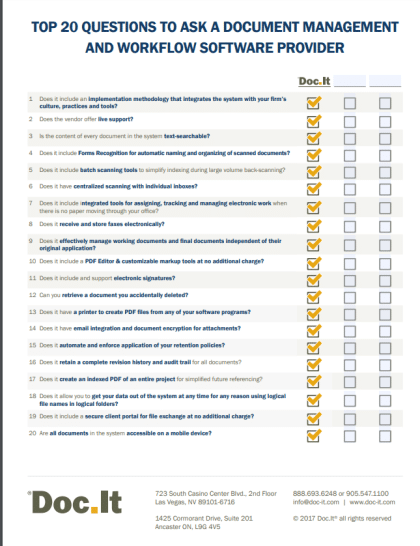20 Questions To Ask A Document Management System Provider

Running a successful accounting firm takes organization, efficiency, and the right tools – and that includes third-party software. But with so many document management system companies out there, how do you know which one is the best fit for your business?
We’ve got you covered. Download our free guide to get you started with your search.
Why Download This Guide?
Whether you’re just starting your search, or finalizing your decision, this checklist of 20 questions will help you find the right document management system.
- Tailored to Accounting Professionals
Your business has unique needs. This checklist is focused specifically on the challenges and requirements accounting firms face when choosing document management software.
- Simplify the Selection Process
Reduce time spent on research and back-and-forth with providers. With the right questions in hand, you can evaluate document management providers easily and efficiently.
Preview: Questions 1-5
1. Does it include an implementation methodology that integrates the system with your firm’s
culture, practices and tools?
2. Does the vendor offer live support?
3. Is the content of every document in the system text-searchable?
4. Does it include Forms Recognition for automatic naming and organizing of scanned documents?
5. Does it include batch scanning tools to simplify indexing during large volume back-scanning?
Complete the form to download the full list.
How hard is it to implement a document management system?
Implementing a comprehensive document management system for your CPA or accounting firm can feel like a mammoth task. The difficulty largely depends on the system you choose, your existing setup, and how well prepared your team is for the transition, so these are key considerations to make before implementation.
In addition to our checklist, here are some further questions you should ask yourself before signing a contract with your chosen document management provider:
Can they integrate with our existing systems?
One challenge can be ensuring the new system works seamlessly with your current document management software, such as accounting or tax preparation platforms. Some offer pre-built integrations with popular accounting tools, which can simplify the process. Others might require custom configuration, which could require more time and technical expertise.
When choosing a new document management system, ask yourself whether it aligns with the software you’re already using.
How much of a learning curve is required?
For any new document management system, there’s a period of adjustment. Your team may need to learn how to use new features, access electronic documents, and understand new workflow automations.
Complex systems with a lot of advanced functionality can lead to steeper learning curves, which might slow things down initially.
Look for document management system that is designed with user-friendly interfaces and robust training resources to help your team get up to speed faster.
Will there be workflow disruptions?
Switching to a new document management system might cause some short-term disruptions. For example, transferring existing files and records into the new system takes time and careful planning to avoid errors.
During the transition, staff may need to rely on both the old and new systems until everything is migrated. Minimizing this overlap often depends on having a clear implementation timeline and support from the provider to guide you through the process.
Are they aligned to our accounting firm’s business goals?
The better the document management system matches your firm’s unique needs, the smoother the implementation will be. For CPA and accounting firms, here are some common goals and objectives that your chosen system may need to meet:
- Reduce reliance on paper documents for easier document sharing
- Improve organization of electronic documents
- Improve workflow automation capabilities
- Double-down on document security and compliance tracking
- Streamline audit trails for reliable document tracking
- Streamline their existing document workflows and future-proof business processes
Visit our Document Management Buyer’s Guide for further insights.

